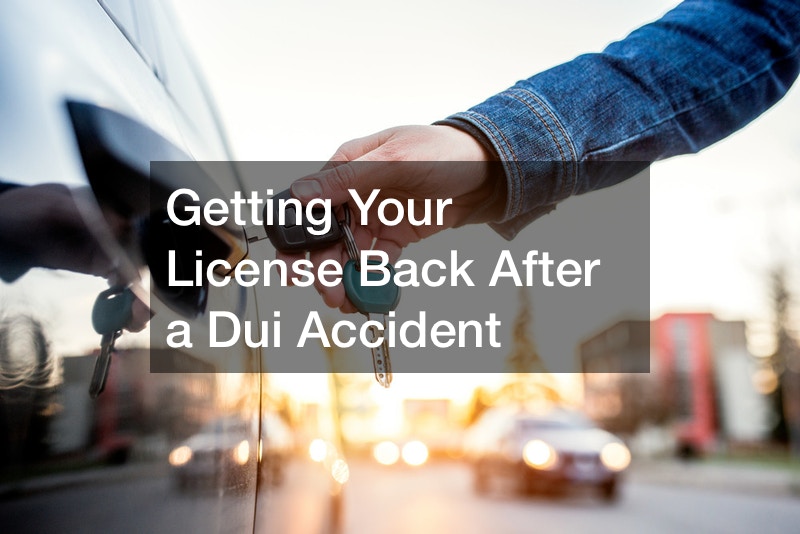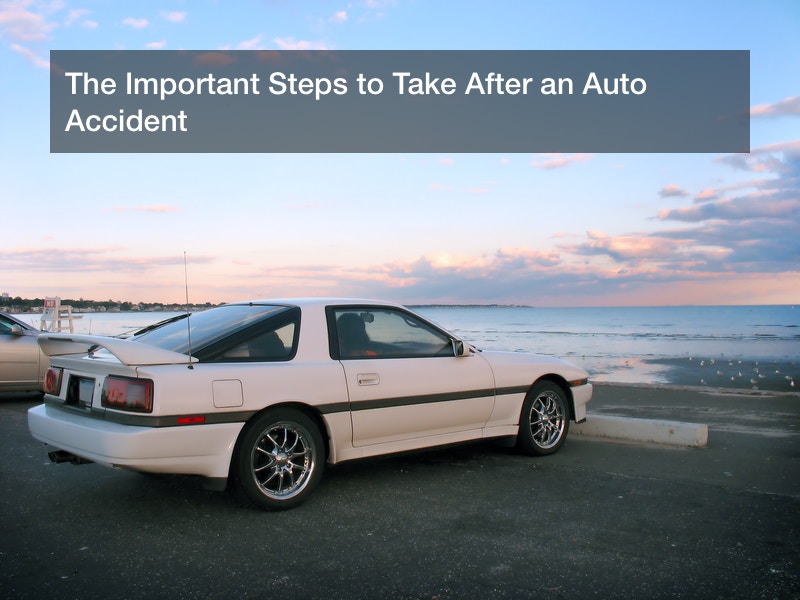The consequences of driving under the influence are severe, mainly when it involves a tragic accident. You could face various penalties, including community service, imprisonment, punitive fines, and mandatory alcohol assessment and treatment. In addition, you could lose your driving license after the case. Getting this license back is not easy, but the insights about car accident law here will help.
Steps to Getting Your License After a DUI

Various states require that your license gets suspended upon conviction. You could attribute this to the significant threat DUI poses to the public, making it a considerably sensitive case. You might need legal help during and after the conviction. Auto accident lawyers will come in handy to get you the best services, as they better understand the accident injury law.
A guilty conviction means that you could face imprisonment, community service, probation, and license suspension. For this reason, you will have to follow these steps to get this license back within a relatively more convenient timeframe.
Serve the License Suspension Period

Your license could get suspended immediately after a hearing. This suspension is often much shorter than the time you will serve in jail. That means you will need to apply for license reinstatement after doing the entire length of your suspension. However, this will only suffice if your jail sentence is much shorter than the suspension period.
Suppose your license suspension period is more extended than when you serve in jail. In this case, you will need to first do jail time before applying for license reinstatement. Keep in mind; the suspension period is often about six months.
Serve Your Sentence

You’ll first need to serve your sentence. Usually, a DUI attracts different jail terms, depending on the nature of the offense. For instance, a first-time offender could be punished with up to six months in county jail. However, this is rarely the case, as most judges consider informal supervision instead of jail time.
Repeat offenders usually get a jail time of over six months. The imprisonment could last for up to one year. In addition, you’ll get three to five years of probation. It will be fair to serve your sentence after applying for license reinstatement. This way, you will be more confident of getting positive results in the long run.
You will also have to pay a fine for the offense. This fine could be between $390 and $1,000, depending on the severity of the case. This amount covers the fine and the penalty assessments.
Attend DUI Traffic School
A DUI school is a program that offers comprehensive alcohol education, aiming at rehabilitating various DUI-prone drivers. The attendant could also be a person who committed a wet driving offense. The state must license the DUI provider before they start offering the service.
The cost of this education varies with the severity of your DUI offense. For instance, an under-21 driver will pay a relatively lower fee. The same applies to first-time offenders. Unfortunately, repeat offenders could pay as high as over $2000. You could attribute this to the extended period they will need to attend the program.
The duration of undertaking this program will also vary. For example, an under-21 first-time offender will go through the program within 12 hours. This period will be spread across a month or two. On the other hand, a repeat offender might need a 60-hour schedule, which could take up to nine months. Some counties could extend this period to approximately 30 months.
Remember, you must complete DUI traffic school before getting your license reinstated. That means you must be dedicated to finishing the program without fuss.
In some instances, you might have to take defensive driving programs. The program will vary with the state. Defensive driving skills will help improve your judgment whenever you are on the road. This program will re-equip you with excellent driving skills and safety expertise. An instructor will assess your skills before the end of the program. Notably, online classes can suffice too.
Clear All the Necessary Fees

You can hardly proceed if you do not clear all the fees related to your case. If you contact bail bond companies, you will have to pay any pending bail bond fees. You will also need to pay court fines and fees for punitive damages. Most of the payable fees will also depend on the nature of the offense and whether you are a repeat offender. It’s important to look for a great bailbonds service to make sure you don’t end up with any additional fees.
Get an Insurance Cover
Once you settle all the required fees, you will have to get proof of insurance. Visit a local insurance carrier and file for auto insurance plans. However, expect the premium to be a little higher after your DUI conviction. This is one of the indirect consequences you’ll suffer from DUI. You could attribute this drastic increase to the fact that insurance carriers view you as a risky driver.
Some states might require you to fill in the SR-22 or FR-44 insurance form, which acts as a certificate of financial responsibility. Unless you have this form, you are not legally allowed to drive in the state. Remember, not all auto insurance companies offer this service. That means you might need to look for a new insurer if your current one does not.
Visit the DMV
Schedule an appointment with the DMV only after getting all the required documents. At the DMV, you will need to take a new driving test and pass. That means you must also pay a fee for this test. Only after you pass the test can you improve your chances of getting the license reinstated. The reinstatement could be immediate or take a few days.
Always be patient when waiting for your reinstatement. That is because various elements go into verifying your credit once more. At the same time, it would help if you avoid driving until you get your license reinstated. This way, you can prevent various legal complications in the long run.
How Do You Know Your License is Cancelled After DUI?
Your license could get canceled by a high court after conviction. However, it will be fair to understand how to monitor and know when the cancelation occurs. There are various ways you can establish this. They include the following.
Confirm With the DMV
Various states have a DMV database, meaning that you will be free to check the status of your license whenever necessary. It would be best to confirm this status after a court session. In most cases, you will have to enter your driving license number, social security number, or any other information that helps identify you.
Ask Your Insurer
Reach out to your insurance company to confirm whether your driver’s license is still valid. The authorities will notify your insurance company upon canceling your license in most cases. Reaching out to them on time will allow you to get comprehensive information on your current status.
Your Email
You’ll often get notified via email whenever your license gets canceled. The DMV will notify your email, reminding you that your license is no longer valid. However, if there are no email records, it would be best to consider the first two approaches.
Why You Need an Attorney for DUI
A DUI case can be significantly overwhelming. Such will be the time to get an experienced lawyer to help you overcome some of the challenges you are likely to face during the process. This attorney will also ensure that your rights are maintained throughout the period, guaranteeing you the best results. The following are some of the top reasons you should hire this DUI lawyer.
Instant Help
A DUI attorney will be ready to offer you the help you need immediately. They will ensure that your rights are protected, meaning that you do not need to divulge information to the arresting police officers. Instead, let the attorney handle all the communication, protecting you against making incriminating statements.
License Reinstatement
A DUI attorney will get your license reinstated. Whether this license has been revoked or licensed, the professional will ensure that you get justice. They will help lessen the charges, making license revocation or suspension seems a bit too harsh. At the same time, this lawyer will support and defend you before a court or tribunal.
Reduced Sentence
An excellent DUI attorney will ensure that your sentence is much fairer in the long run. You will rely on them to argue for a sentence reduction, ensuring that you do not spend too much time behind bars or even get bail services for you. Remember, regular offenders, are likely to spend a significant amount of time in jail. A professional will protect you from this, securing bail bonds whenever necessary.
Understanding of the System
Lawyers understand how the law works, meaning they know how to maneuver to ensure that their clients get justice. These professionals have also built strong relationships with the prosecution, meaning that they could get your case dismissed.
In addition, you can rely on this attorney to help erase your DUI records. This will often suffice for first-time offenders. At the same time, the attorney will help ease the penalties on the car tints and fees attached to your case, saving you a significant amount of money in the long run.
What Happens to Your Vehicle After a DUI Conviction?
Undoubtedly, you want to protect your assets from repossession. Yet, this will hardly be the case if you get convicted in a DUI case. You will scarcely have the car behind your garage doors, at least until everything settles down. Various things could happen during this period, including the following.
Short Term Vehicle Impoundment
An officer can impound your vehicle when they find out that you are driving under the influence. It is within their discretion, meaning that they are not duty-bound. In most cases, they will consider short-term impoundments because they are not ready to call their friends or family. In addition, they could consider this move if they want to search for the vehicle for further evidence.
Suppose you are disrespectful, uncooperative, or aggressive during an arrest. In this case, a police officer is free to impound the vehicle and tow it to the police station.
Short-term impounding implies that you will get your vehicle within a few days. However, you will need to pay the towing and impounding fees. Such fees will vary from state to state. The towing company could also determine how much you pay in the long run.
Long-Term Impoundment
Your vehicle could also get impounded for a long time. This impoundment form implies that you will not get your car back within a few days. Instead, it could take weeks, months, or even a year. Long-term impoundments happen for various reasons, including if you are suspected of driving on a suspended license.
IF this car is not yours, the owner could be asked to come to pick it up. However, if the vehicle is yours, you might need to clear it with the authorities before getting it back.
Usually, long-term impoundment exposes you to various expenses. You will need to part with the towing and impoundment fees. Sometimes, you will need to pay a per-day fee, which could go to over $8000 a year.
Remember, long-term impoundment could also mean that your vehicle remains in custody forever. This will happen if you have been convicted of DUI several times.
Vehicle Sanctions
Different states sanction vehicles differently. Sanctions often happen after your conviction. For instance, the court could immobilize your vehicle until you finish serving your sentence. Immobilization implies that an immobilizing device will be attached to your car, rendering it immobile. This is an affordable way to keep your vehicle safe.
Ignition interlock devices could also come in handy. These devices allow you to drive within the state. However, it would help if you met specific qualifications to be allowed to drive again.
In conclusion, regaining your license after a DUI conviction is seemingly straightforward. The insights above will help you get it reinstated within a relatively short time. However, it would be best to avoid driving under the influence altogether.


